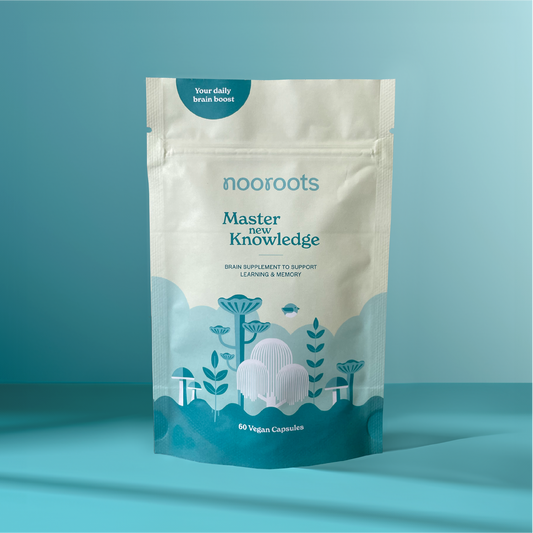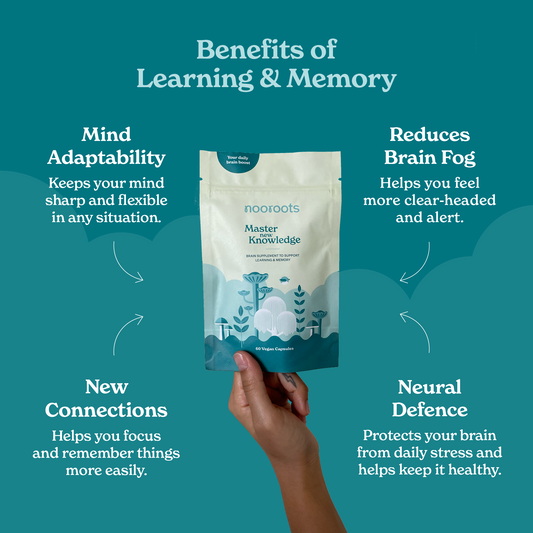Holy Basil (Ocimum sanctum), commonly known as Tulsi, has held a place of honor in Ayurvedic medicine for centuries. Traditionally regarded as a sacred plant in South Asia, it has been used to support resilience, vitality, and spiritual well-being.
In recent years, Holy Basil has attracted growing interest in the field of cognitive and mental health. Classified as an adaptogen, it’s believed to help the body adapt to physical and psychological stress while supporting mental clarity and emotional balance. These properties have led researchers to explore its potential as a natural nootropic — a compound that may enhance cognitive function and mood.
One such study, “Controlled Programmed Trial of Ocimum sanctum Leaf on Generalized Anxiety Disorder” by Bhattacharyya et al. (2008), provides a scientific lens through which to evaluate Tulsi’s traditional reputation. This investigation offers valuable insights into how an ancient herbal remedy might integrate with modern, evidence-based approaches to managing anxiety and promoting mental well-being.
Contents
- Background
- Study Overview
- Results
- Discussion
- Conclusion
Holy Basil and Generalized Anxiety Disorder

Background
For centuries, Holy Basil (Ocimum sanctum or Tulsi) has been a foundational herb in Ayurvedic medicine, valued for its broad range of health-supportive properties. Traditionally, it has been used to promote vitality, restore balance within the body, and enhance resilience to the physical and emotional challenges of daily life.
As interest in herbal and complementary medicine has grown in the West, Holy Basil has gained recognition as a potential adaptogenic and nootropic herb. Adaptogens are natural compounds that may help the body regulate stress responses, while nootropics are associated with supporting cognitive performance and mood. Early studies and clinical observations suggest that Holy Basil may help reduce stress, anxiety, and depressive symptoms — potentially by modulating cortisol levels and influencing neurotransmitters such as dopamine and serotonin (Cohen, 2014; Jamshidi, 2017).
Study Overview
The clinical study titled “Controlled Programmed Trial of Ocimum sanctum Leaf on Generalized Anxiety Disorder (GAD)” was conducted by D. Bhattacharyya, T. K. Sur, U. Jana, and P. K. Debnath, and published in Nepal Medical College Journal in October 2008.
This research set out to evaluate the potential anxiolytic (anxiety-reducing) effects of Holy Basil (Ocimum sanctum) in individuals diagnosed with Generalized Anxiety Disorder. The trial followed a structured, fixed-dose regimen involving 35 adult participants (21 men and 14 women) with a mean age of 38.4 years. Each participant received 500 mg of Holy Basil extract twice daily after meals for a duration of 60 days.
To measure the therapeutic effects, researchers used the Hamilton’s Brief Psychiatric Rating Scale (BPRS)—a validated tool for assessing changes in anxiety and mood-related symptoms. Participants were evaluated at three points: baseline (day 0), midpoint (day 30), and at the conclusion of the trial (day 60), allowing for an objective assessment of symptom progression over time.
Results
The findings from Bhattacharyya et al. (2008) were notably encouraging. Participants who received Holy Basil (Ocimum sanctum) extract experienced significant reductions in anxiety, stress, and depressive symptoms over the 60-day trial period.
Quantitatively, the anxiety index decreased from a baseline average of 84.42 to 55.54, representing a 34.2% reduction (p < 0.001). The stress index declined by 27.5%, while the depression index fell by 30.8%—all statistically significant improvements.
These results suggest that Holy Basil may exert measurable anxiolytic and antidepressant effects, likely linked to its adaptogenic mechanisms and potential modulation of the hypothalamic-pituitary-adrenal (HPA) axis and neurotransmitter balance (Cohen, 2014; Jamshidi & Cohen, 2017).
Overall, this study reinforces the traditional Ayurvedic understanding of Holy Basil as a tonic for mental well-being and positions it as a promising, evidence-supported option in the natural management of anxiety disorders.
Discussion
The study’s results highlight Holy Basil (Ocimum sanctum) as a promising natural agent for reducing anxiety, stress, and depressive symptoms. Its efficacy in improving mood and emotional stability positions it among the most interesting plant-based candidates in the realm of adaptogenic and nootropic research.
Unlike conventional anxiolytics such as benzodiazepines, which can cause sedation, cognitive dulling, or dependence, Holy Basil appears to provide mental calmness without impairing alertness or inducing withdrawal effects. This aligns with the growing public and clinical interest in natural, low-risk interventions for managing stress and mood disorders.
That said, the study by Bhattacharyya et al. (2008) had important limitations. The sample size was small (35 participants), and the trial duration of 60 days limits long-term conclusions about safety and sustained efficacy. Larger, placebo-controlled studies with longer follow-up periods are needed to confirm these initial findings and clarify the mechanisms through which Holy Basil influences the stress response and neurotransmitter activity.
From a practical standpoint, daily supplementation with standardized Holy Basil extract may offer benefits for individuals seeking natural support for stress and anxiety management. When combined with holistic lifestyle practices — such as mindfulness, adequate sleep, and balanced nutrition — Tulsi could contribute meaningfully to overall emotional well-being and resilience.
Conclusion
The findings from Bhattacharyya et al. (2008) highlight Holy Basil (Ocimum sanctum) as a promising natural option for reducing symptoms of Generalized Anxiety Disorder (GAD) and promoting overall mental well-being. Its demonstrated ability to lower anxiety, stress, and depressive symptoms supports its traditional use as an adaptogenic herb that helps the body and mind adapt to everyday challenges.
For individuals seeking natural alternatives to conventional medication, incorporating Holy Basil into a daily wellness routine — ideally under the guidance of a qualified healthcare provider — can be a valuable step toward supporting calmness, focus, and emotional resilience as part of a holistic lifestyle.







